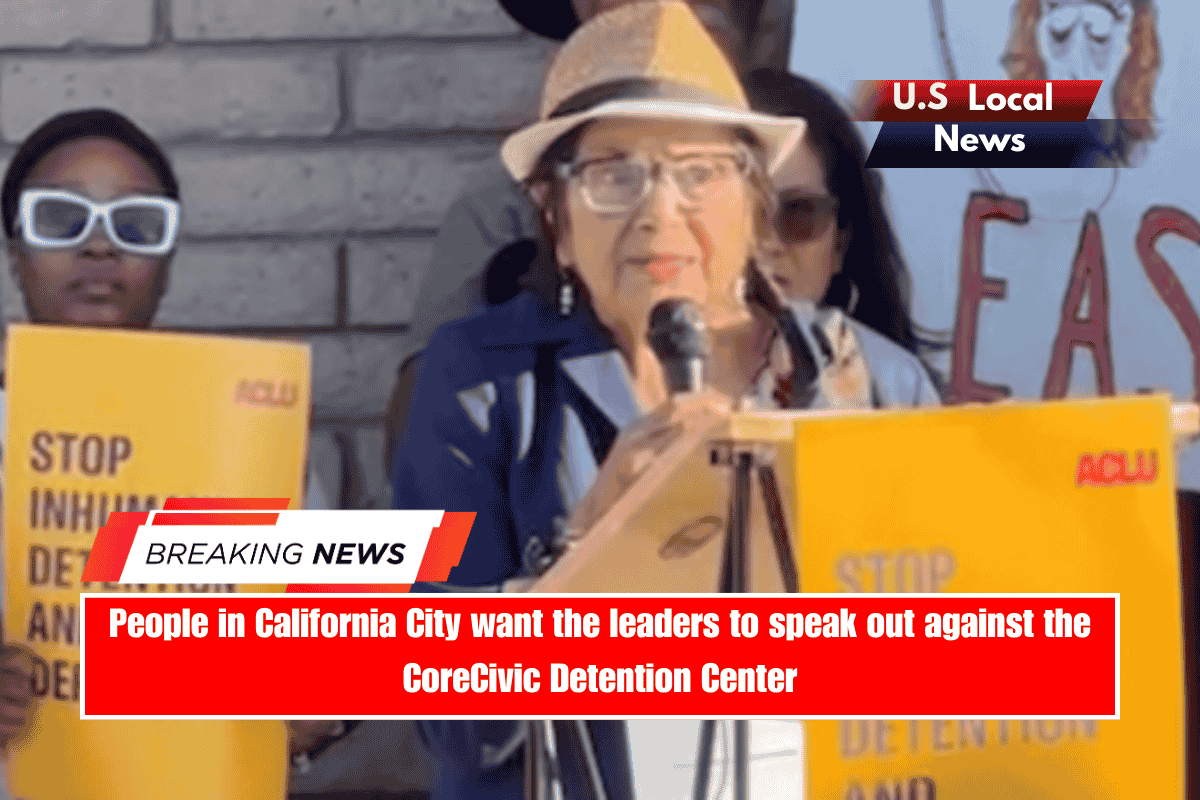During Tuesday evening’s California City Planning Commission meeting, advocates and residents spoke out against the unexpected opening of a new CoreCivic immigration detention facility, urging local leaders to take a firmer stance against what they described as an unlawful and harmful operation.
Prior to the meeting, advocates from the Rapid Response Network of Kern and the Dolores Huerta Foundation held an emergency press conference outside the California City chambers, calling for the facility’s closure. Rosa Lopez, a volunteer with the Rapid Response Network, urged officials to reject CoreCivic’s business license application and highlight the company’s lack of transparency.
“If they’re applying for a business license, that means they are making a business out of cleaning our immigrant communities,” Lopez informed us. She accused CoreCivic and ICE of violating the law and operating without permits, pointing out that at least 13 people have died in immigration detention centers this year, the highest number in decades. “We are asking the state, the elected officials here in California City, and our members of Congress to demand the shutdown of the California City detention center and instead invest in healthy communities, not cages.”
Inside the commission chambers, many residents said the news of the facility transfers caught them off guard, especially since it is unclear whether CoreCivic has the necessary permits.
“We’re really outraged,” said Marcella Hernandez from the Detention Watch Network. “These corporations lie, conceal information, and operate without proper approval. We are asking you to speak up and hold them accountable.
Speakers expressed moral and practical concerns about the detention center. Nisha White, a homeowner and Dolores Huerta Foundation organizer, questioned why CoreCivic is operating without a business license.
“What business could ever come to California City without having a license and still be operational?” asked the lady. She warned that private prison operators frequently make financially distressed cities worse off, citing examples where other municipalities owed millions of dollars. “It’s a humanitarian issue. We need businesses that build up the city, not tear it down.
Others discussed the reputational and ethical costs of working with CoreCivic.
“As a marketing professional, I’m appalled,” said resident Elena Smith. “California City’s alliance with organizations known for human and civil rights violations is not a good look. If you’re against this, you should fight back with everything you have.”
Natalia from the Coalition for Humane Immigrant Rights claimed that the city’s lack of transparency undermines community trust.
“Rules are in place to ensure accountability, fairness, and public safety,” she told the audience. “If you overlook them, you create the perception that some entities are above the law, while everyday residents and small businesses must comply.”
Others saw the issue as deeply personal. Berto Hernandez of the California Immigrant Youth Justice Alliance described their own detention experience, criticizing officials for praying at the beginning of the meeting while allowing a facility that they claimed would separate families and cause suffering.
“How Christian and godly is that?” they inquired. “As someone who has been detained, witnessed sexual abuse, and family separation, you cannot tell me that is Christian. I’m tired of people preaching God’s word and then doing the most horrendous things.”
Advocates also raised legal issues, citing California’s SB 29 law, which requires public hearings and advance notice for detention permits, as well as concerns that the city violated open meeting laws under the Brown Act. Advocates warned the commission that transparency, proper licensing, and public trust are not options; they are required.
Despite the flood of testimony, planning officials reiterated that the commission has no authority over CoreCivic’s application, which falls under a Site Plan Review (SPR) minor. The company recently resubmitted paperwork to update its business and operational plans, which are currently being reviewed by city staff. The filing did not include any environmental documents.
Nonetheless, residents insisted that commissioners use their voices to oppose the facility. “If you can’t vote on this permit,” Hernandez told the commission, “then put out a statement saying you don’t want this business in your community.”









